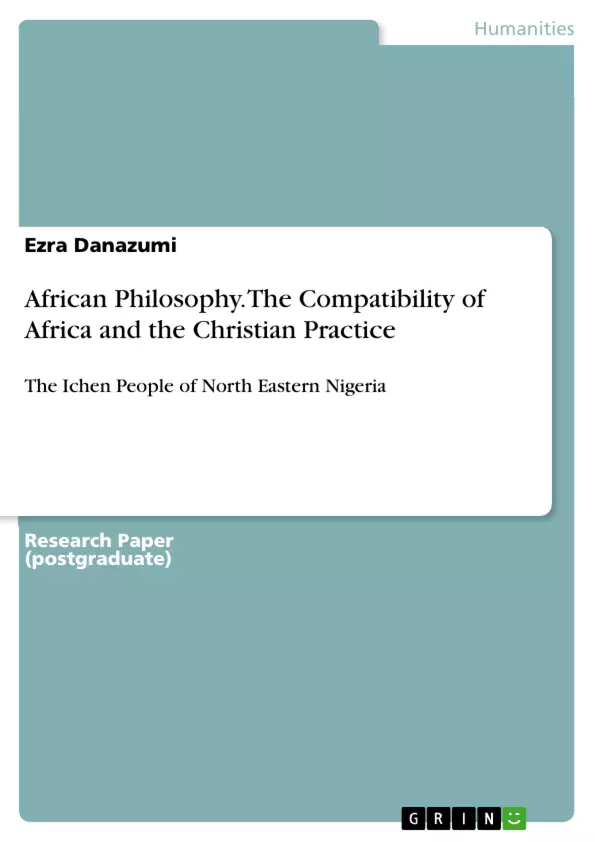This study analyses how the philosophy of divorce in Ichen (Nigeria) is compatible with the Christian viewpoint.
The issue of divorce is a long seated problem in human history particularly in Nigerian context where the Church is facing numerous issues of divorce. Also, on the interpretation and application of “divorce”, scholars still find it difficult to agree on the supremacy of the scripture (Phuong, Divorce/Africa). Most of the African tribes frown at divorce in which it used to be a taboo, and it is still consider a serious insult in some tribes in Africa. In the real sense divorce is becoming a new normal in some Africa communities today.
Inhaltsverzeichnis (Table of Contents)
- INTRODUCTION
- DEFINITION OF KEY TERM
- THE CHRISTIAN PRINCIPLES OF DIVORCE.
- THE CONFLUENCE OF ICHEN AND CHRSTIAN PHILOSOPHY OF DIVORCE..
- THE IMPLICATION OF ICHEN AND CHRISTIAN VIEW OF NO DIVORCE ..
- CONCLUSION...
- RECOMMENDATIONS.
- WORKS CITED
Zielsetzung und Themenschwerpunkte (Objectives and Key Themes)
The study examines the compatibility between the Ichen practice of divorce and the Christian worldview. It investigates whether the Ichen traditional philosophy of divorce aligns with the Christian perspective.
- The historical and phenomenological perspectives of divorce among the Ichen people.
- The principles of marriage security against divorce in Ichen tradition.
- The Christian principles of divorce and their comparison with Ichen practices.
- The confluence of Ichen and Christian philosophies of divorce.
- The implications of the "no divorce" stance in both Ichen tradition and Christian teachings.
Zusammenfassung der Kapitel (Chapter Summaries)
The introduction provides background information on the issue of divorce, particularly within the Nigerian context, highlighting its significance in the Church and the ongoing debate among scholars regarding the interpretation and application of divorce in Scripture. It also points out the increasing prevalence of divorce in some African communities despite its traditional taboo status.
The study explores the principles of divorce among the Ichen people of Taraba, examining the historical context and the traditional practices surrounding divorce. It investigates how Ichen culture has traditionally sought to prevent divorce, emphasizing the role of family involvement, community social taboos, ancestral beliefs, and proverbs.
The paper delves into the Christian view of divorce, exploring the biblical principles and theological perspectives on the subject. It examines the understanding of divorce as a lifelong institution ordained by God, emphasizing the ideal of enduring marriage.
The study then examines the confluence of Ichen and Christian perspectives on divorce, analyzing the similarities and differences between the two philosophies. It seeks to demonstrate the compatibility between the Ichen practice of "no divorce" and the Christian worldview, highlighting the shared emphasis on lifelong commitment and marital stability.
Schlüsselwörter (Keywords)
The key focus areas and topics of the study include divorce, compatibility, traditional Ichen practices, Christian principles, marriage security, and the confluence of Ichen and Christian perspectives on marriage and divorce.
Frequently Asked Questions
What is the main objective of the study on Ichen divorce practices?
The study analyzes the compatibility between the traditional divorce philosophy of the Ichen people in Nigeria and the Christian worldview, examining if their "no divorce" stance aligns with biblical principles.
How does Ichen tradition view divorce?
In Ichen tradition, divorce is generally frowned upon and often considered a taboo or a serious insult. The culture emphasizes marriage security through family involvement and community social taboos.
What are the Christian principles regarding divorce mentioned in the text?
Christianity views marriage as a lifelong institution ordained by God. The study explores biblical perspectives that emphasize enduring marriage and the ideal of not seeking divorce.
What methods did Ichen culture use to prevent divorce?
The culture used ancestral beliefs, proverbs, community social taboos, and heavy family involvement to ensure marital stability and prevent the dissolution of marriages.
Is divorce becoming more common in African communities today?
Yes, the abstract notes that despite traditional taboos, divorce is becoming a "new normal" in some African communities and is a significant issue facing the Church in Nigeria.
- Quote paper
- Ezra Danazumi (Author), 2019, African Philosophy. The Compatibility of Africa and the Christian Practice, Munich, GRIN Verlag, https://www.grin.com/document/1014676



